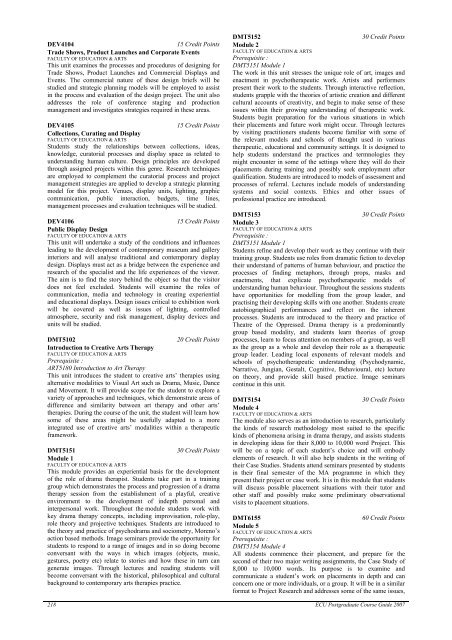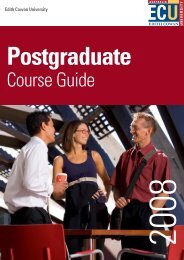Course Guide - Edith Cowan University
Course Guide - Edith Cowan University
Course Guide - Edith Cowan University
You also want an ePaper? Increase the reach of your titles
YUMPU automatically turns print PDFs into web optimized ePapers that Google loves.
DEV4104<br />
15 Credit Points<br />
Trade Shows, Product Launches and Corporate Events<br />
FACULTY OF EDUCATION & ARTS<br />
This unit examines the processes and procedures of designing for<br />
Trade Shows, Product Launches and Commercial Displays and<br />
Events. The commercial nature of these design briefs will be<br />
studied and strategic planning models will be employed to assist<br />
in the process and evaluation of the design project. The unit also<br />
addresses the role of conference staging and production<br />
management and investigates strategies required in these areas.<br />
DEV4105<br />
15 Credit Points<br />
Collections, Curating and Display<br />
FACULTY OF EDUCATION & ARTS<br />
Students study the relationships between collections, ideas,<br />
knowledge, curatorial processes and display space as related to<br />
understanding human culture. Design principles are developed<br />
through assigned projects within this genre. Research techniques<br />
are employed to complement the curatorial process and project<br />
management strategies are applied to develop a strategic planning<br />
model for this project. Venues, display units, lighting, graphic<br />
communication, public interaction, budgets, time lines,<br />
management processes and evaluation techniques will be studied.<br />
DEV4106<br />
15 Credit Points<br />
Public Display Design<br />
FACULTY OF EDUCATION & ARTS<br />
This unit will undertake a study of the conditions and influences<br />
leading to the development of contemporary museum and gallery<br />
interiors and will analyse traditional and contemporary display<br />
design. Displays must act as a bridge between the experience and<br />
research of the specialist and the life experiences of the viewer.<br />
The aim is to find the story behind the object so that the visitor<br />
does not feel excluded. Students will examine the roles of<br />
communication, media and technology in creating experiential<br />
and educational displays. Design issues critical to exhibition work<br />
will be covered as well as issues of lighting, controlled<br />
atmosphere, security and risk management, display devices and<br />
units will be studied.<br />
DMT5102<br />
20 Credit Points<br />
Introduction to Creative Arts Therapy<br />
FACULTY OF EDUCATION & ARTS<br />
Prerequisite :<br />
ART5180 Introduction to Art Therapy<br />
This unit introduces the student to creative arts’ therapies using<br />
alternative modalities to Visual Art such as Drama, Music, Dance<br />
and Movement. It will provide scope for the student to explore a<br />
variety of approaches and techniques, which demonstrate areas of<br />
difference and similarity between art therapy and other arts’<br />
therapies. During the course of the unit, the student will learn how<br />
some of these areas might be usefully adapted to a more<br />
integrated use of creative arts’ modalities within a therapeutic<br />
framework.<br />
DMT5151<br />
30 Credit Points<br />
Module 1<br />
FACULTY OF EDUCATION & ARTS<br />
This module provides an experiential basis for the development<br />
of the role of drama therapist. Students take part in a training<br />
group which demonstrates the process and progression of a drama<br />
therapy session from the establishment of a playful, creative<br />
environment to the development of indepth personal and<br />
interpersonal work. Throughout the module students work with<br />
key drama therapy concepts, including improvisation, role-play,<br />
role theory and projective techniques. Students are introduced to<br />
the theory and practice of psychodrama and sociometry, Moreno’s<br />
action based methods. Image seminars provide the opportunity for<br />
students to respond to a range of images and in so doing become<br />
conversant with the ways in which images (objects, music,<br />
gestures, poetry etc) relate to stories and how these in turn can<br />
generate images. Through lectures and reading students will<br />
become conversant with the historical, philosophical and cultural<br />
background to contemporary arts therapies practice.<br />
DMT5152<br />
30 Credit Points<br />
Module 2<br />
FACULTY OF EDUCATION & ARTS<br />
Prerequisite :<br />
DMT5151 Module 1<br />
The work in this unit stresses the unique role of art, images and<br />
enactment in psychotherapeutic work. Artists and performers<br />
present their work to the students. Through interactive reflection,<br />
students grapple with the theories of artistic creation and different<br />
cultural accounts of creativity, and begin to make sense of these<br />
issues within their growing understanding of therapeutic work.<br />
Students begin preparation for the various situations in which<br />
their placements and future work might occur. Through lectures<br />
by visiting practitioners students become familiar with some of<br />
the relevant models and schools of thought used in various<br />
therapeutic, educational and community settings. It is designed to<br />
help students understand the practices and termnologies they<br />
might encounter in some of the settings where they will do their<br />
placements during training and possibly seek employment after<br />
qualification. Students are introduced to models of assessment and<br />
processes of referral. Lectures include models of understanding<br />
systems and social contexts. Ethics and other issues of<br />
professional practice are introduced.<br />
DMT5153<br />
30 Credit Points<br />
Module 3<br />
FACULTY OF EDUCATION & ARTS<br />
Prerequisite :<br />
DMT5151 Module 1<br />
Students refine and develop their work as they continue with their<br />
training group. Students use roles from dramatic fiction to develop<br />
their understand of patterns of human behaviour, and practice the<br />
processes of finding metaphors, through props, masks and<br />
enactments, that explicate psychotherapeutic models of<br />
understanding human behaviour. Throughout the sessions students<br />
have opportunities for modelling from the group leader, and<br />
practising their developing skills with one another. Students create<br />
autobiographical performances and reflect on the inherent<br />
processes. Students are introduced to the theory and practice of<br />
Theatre of the Oppressed. Drama therapy is a predominantly<br />
group based modality, and students learn theories of group<br />
processes, learn to focus attention on members of a group, as well<br />
as the group as a whole and develop their role as a therapeutic<br />
group leader. Leading local exponents of relevant models and<br />
schools of psychotherapeutic understanding (Psychodynamic,<br />
Narrative, Jungian, Gestalt, Cognitive, Behavioural, etc) lecture<br />
on theory, and provide skill based practice. Image seminars<br />
continue in this unit.<br />
DMT5154<br />
30 Credit Points<br />
Module 4<br />
FACULTY OF EDUCATION & ARTS<br />
The module also serves as an introduction to research, particularly<br />
the kinds of research methodology most suited to the specific<br />
kinds of phenomena arising in drama therapy, and assists students<br />
in developing ideas for their 8,000 to 10,000 word Project. This<br />
will be on a topic of each student’s choice and will embody<br />
elements of research. It will also help students in the writing of<br />
their Case Studies. Students attend seminars presented by students<br />
in their final semester of the MA programme in which they<br />
present their project or case work. It is in this module that students<br />
will discuss possible placement situations with their tutor and<br />
other staff and possibly make some preliminary observational<br />
visits to placement situations.<br />
DMT6155<br />
60 Credit Points<br />
Module 5<br />
FACULTY OF EDUCATION & ARTS<br />
Prerequisite :<br />
DMT5154 Module 4<br />
All students commence their placement, and prepare for the<br />
second of their two major writing assignments, the Case Study of<br />
8,000 to 10,000 words. Its purpose is to examine and<br />
communicate a student’s work on placements in depth and can<br />
concern one or more individuals, or a group. It will be in a similar<br />
format to Project Research and addresses some of the same issues,<br />
218 ECU Postgraduate <strong>Course</strong> <strong>Guide</strong> 2007



